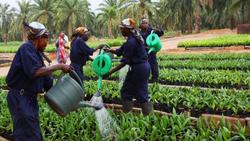The Times | 2 January 2021
$76m in British aid lost as African project goes bust
A failed palm oil enterprise in one of the world’s poorest countries has blown more than $76 million of British aid.
The business, on disputed land in the Democratic Republic of Congo where there has been a record of human rights conflicts, has gone bankrupt. Its assets have been transferred to a privately owned entity, leaving Britain’s shareholding in the collapsed company worthless.
Sarah Champion, chairwoman of the international development committee, told The Times that MPs had repeatedly raised concerns over Britain’s investment and would now hold those responsible to account.
The fiasco raises fresh concerns about the role of the British overseas development bank CDC Group, which is under fire from aid campaigners over a weak record on poverty relief. The group has been criticised for investing in such commercial ventures as luxury apartments for western gas workers in Mozambique, coffee shops in Kenya, an Indian celebrity chef’s cookware brand and five-star hotels in Africa. CDC Group sources said that its investments had to make positive economic, social or environmental impacts such as promoting jobs and skills.
CDC Group was the biggest investor in Feronia Inc, a Canadian-listed company whose subsidiary operated a palm oil plantation on three sites in remote parts of the Democratic Republic of Congo, the war-torn central African country formerly known as Zaire. The Canadian holding company has gone bankrupt and the subsidiary’s assets are now in the hands of a Belgium-based firm called Feronia KNM, mostly owned by US-based private equity businesses.
Feronia Inc’s use of the land, close to the River Congo, was disputed by community leaders who argued that the plantation deprived them of their customary access to forests and water, causing deep poverty and extreme food insecurity.
Local communities also objected that they had suffered grave physical and human rights abuses from security guards protecting Feronia Inc’s subsidiary, Plantations et Huileries du Congo, and from the police.
A formal complaint by the Congolese land rights campaigners RIAO-RDC on behalf of the communities was filed in 2018 with Germany’s aid bank, leader of a continental group of development lenders to the business. An investigation is under way.
CDC Group has said that it supports an independent mediation arising from the complaint. The new owners have said that they will act on its recommendations.
Britain’s development bank bought more than a quarter of the plantation company’s shares in 2013 and ploughed in $76.6 million over seven years, according to a Freedom of Information search by the campaign group Global Justice Now. Daniel Willis, its development campaigner, said: “After nearly eight years and $80 million CDC has basically nothing to show for its investment in Feronia, while local workers and communities are still searching for justice.”
CDC said: “Over $7 million has been spent on medical and educational facilities and on restoring clean water provision for nearly 100,000 people . . . Over $65 million has been invested in new mills and agricultural improvements. Wages have more than doubled. This is categorically not money that has been wasted. Had it been provided as aid grant funding it would be regarded as money well spent.”














